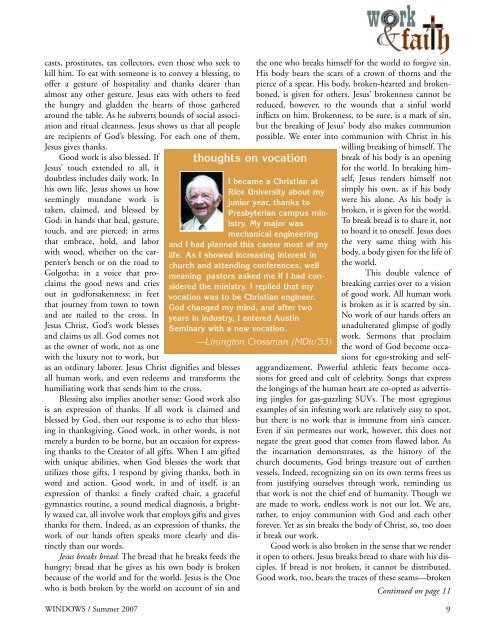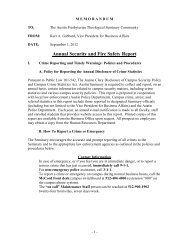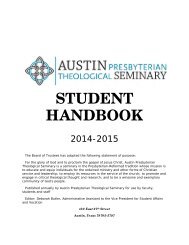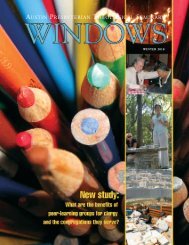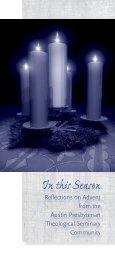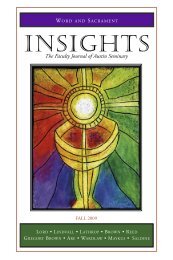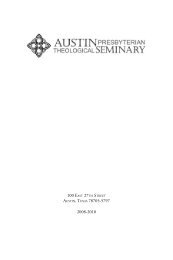AUSTIN PRESBYTERIAN THEOLOGICAL SEMINARY
windows summer 07 - Austin Presbyterian Theological Seminary
windows summer 07 - Austin Presbyterian Theological Seminary
- No tags were found...
Create successful ePaper yourself
Turn your PDF publications into a flip-book with our unique Google optimized e-Paper software.
casts, prostitutes, tax collectors, even those who seek to<br />
kill him. To eat with someone is to convey a blessing, to<br />
offer a gesture of hospitality and thanks dearer than<br />
almost any other gesture. Jesus eats with others to feed<br />
the hungry and gladden the hearts of those gathered<br />
around the table. As he subverts bounds of social association<br />
and ritual cleanness, Jesus shows us that all people<br />
are recipients of God’s blessing. For each one of them,<br />
Jesus gives thanks.<br />
Good work is also blessed. If<br />
Jesus’ touch extended to all, it<br />
doubtless includes daily work. In<br />
his own life, Jesus shows us how<br />
seemingly mundane work is<br />
taken, claimed, and blessed by<br />
God: in hands that heal, gesture,<br />
touch, and are pierced; in arms<br />
that embrace, hold, and labor<br />
with wood, whether on the carpenter’s<br />
bench or on the road to<br />
Golgotha; in a voice that proclaims<br />
the good news and cries<br />
out in godforsakenness; in feet<br />
that journey from town to town<br />
and are nailed to the cross. In<br />
Jesus Christ, God’s work blesses<br />
and claims us all. God comes not<br />
as the owner of work, not as one<br />
with the luxury not to work, but<br />
as an ordinary laborer. Jesus Christ dignifies and blesses<br />
all human work, and even redeems and transforms the<br />
humiliating work that sends him to the cross.<br />
Blessing also implies another sense: Good work also<br />
is an expression of thanks. If all work is claimed and<br />
blessed by God, then our response is to echo that blessing<br />
in thanksgiving. Good work, in other words, is not<br />
merely a burden to be borne, but an occasion for expressing<br />
thanks to the Creator of all gifts. When I am gifted<br />
with unique abilities, when God blesses the work that<br />
utilizes those gifts, I respond by giving thanks, both in<br />
word and action. Good work, in and of itself, is an<br />
expression of thanks: a finely crafted chair, a graceful<br />
gymnastics routine, a sound medical diagnosis, a brightly<br />
waxed car, all involve work that employs gifts and gives<br />
thanks for them. Indeed, as an expression of thanks, the<br />
work of our hands often speaks more clearly and distinctly<br />
than our words.<br />
Jesus breaks bread. The bread that he breaks feeds the<br />
hungry; bread that he gives as his own body is broken<br />
because of the world and for the world. Jesus is the One<br />
who is both broken by the world on account of sin and<br />
thoughts on vocation<br />
I became a Christian at<br />
Rice University about my<br />
junior year, thanks to<br />
Presbyterian campus ministry.<br />
My major was<br />
mechanical engineering<br />
and I had planned this career most of my<br />
life. As I showed increasing interest in<br />
church and attending conferences, well<br />
meaning pastors asked me if I had considered<br />
the ministry. I replied that my<br />
vocation was to be Christian engineer.<br />
God changed my mind, and after two<br />
years in industry, I entered Austin<br />
Seminary with a new vocation.<br />
the one who breaks himself for the world to forgive sin.<br />
His body bears the scars of a crown of thorns and the<br />
pierce of a spear. His body, broken-hearted and brokenboned,<br />
is given for others. Jesus’ brokenness cannot be<br />
reduced, however, to the wounds that a sinful world<br />
inflicts on him. Brokenness, to be sure, is a mark of sin,<br />
but the breaking of Jesus’ body also makes communion<br />
possible. We enter into communion with Christ in his<br />
willing breaking of himself. The<br />
break of his body is an opening<br />
for the world. In breaking himself,<br />
Jesus renders himself not<br />
simply his own, as if his body<br />
were his alone. As his body is<br />
broken, it is given for the world.<br />
To break bread is to share it, not<br />
to hoard it to oneself. Jesus does<br />
the very same thing with his<br />
body, a body given for the life of<br />
the world.<br />
This double valence of<br />
breaking carries over to a vision<br />
of good work. All human work<br />
is broken as it is scarred by sin.<br />
No work of our hands offers an<br />
unadulterated glimpse of godly<br />
work. Sermons that proclaim<br />
the word of God become occasions<br />
for ego-stroking and selfaggrandizement.<br />
Powerful athletic feats become occasions<br />
for greed and cult of celebrity. Songs that express<br />
the longings of the human heart are co-opted as advertising<br />
jingles for gas-guzzling SUVs. The most egregious<br />
examples of sin infesting work are relatively easy to spot,<br />
but there is no work that is immune from sin’s cancer.<br />
Even if sin permeates our work, however, this does not<br />
negate the great good that comes from flawed labor. As<br />
the incarnation demonstrates, as the history of the<br />
church documents, God brings treasure out of earthen<br />
vessels. Indeed, recognizing sin on its own terms frees us<br />
from justifying ourselves through work, reminding us<br />
that work is not the chief end of humanity. Though we<br />
are made to work, endless work is not our lot. We are,<br />
rather, to enjoy communion with God and each other<br />
forever. Yet as sin breaks the body of Christ, so, too does<br />
it break our work.<br />
Good work is also broken in the sense that we render<br />
it open to others. Jesus breaks bread to share with his disciples.<br />
If bread is not broken, it cannot be distributed.<br />
Good work, too, bears the traces of these seams—broken<br />
—Linington Crossman (MDiv’53)<br />
Continued on page 11<br />
WINDOWS / Summer 2007 9


